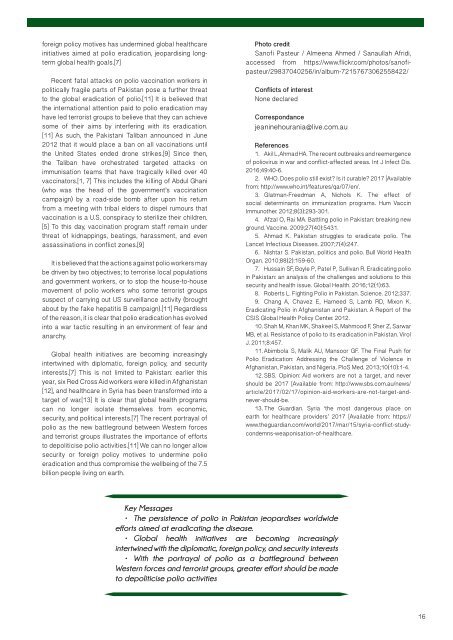Vector Volume 11 Issue 2 - 2017
Create successful ePaper yourself
Turn your PDF publications into a flip-book with our unique Google optimized e-Paper software.
foreign policy motives has undermined global healthcare<br />
initiatives aimed at polio eradication, jeopardising longterm<br />
global health goals.[7]<br />
Recent fatal attacks on polio vaccination workers in<br />
politically fragile parts of Pakistan pose a further threat<br />
to the global eradication of polio.[<strong>11</strong>] It is believed that<br />
the international attention paid to polio eradication may<br />
have led terrorist groups to believe that they can achieve<br />
some of their aims by interfering with its eradication.<br />
[<strong>11</strong>] As such, the Pakistani Taliban announced in June<br />
2012 that it would place a ban on all vaccinations until<br />
the United States ended drone strikes.[9] Since then,<br />
the Taliban have orchestrated targeted attacks on<br />
immunisation teams that have tragically killed over 40<br />
vaccinators.[1, 7] This includes the killing of Abdul Ghani<br />
(who was the head of the government’s vaccination<br />
campaign) by a road-side bomb after upon his return<br />
from a meeting with tribal elders to dispel rumours that<br />
vaccination is a U.S. conspiracy to sterilize their children.<br />
[5] To this day, vaccination program staff remain under<br />
threat of kidnappings, beatings, harassment, and even<br />
assassinations in conflict zones.[9]<br />
It is believed that the actions against polio workers may<br />
be driven by two objectives; to terrorise local populations<br />
and government workers, or to stop the house-to-house<br />
movement of polio workers who some terrorist groups<br />
suspect of carrying out US surveillance activity (brought<br />
about by the fake hepatitis B campaign).[<strong>11</strong>] Regardless<br />
of the reason, it is clear that polio eradication has evolved<br />
into a war tactic resulting in an environment of fear and<br />
anarchy.<br />
Global health initiatives are becoming increasingly<br />
intertwined with diplomatic, foreign policy, and security<br />
interests.[7] This is not limited to Pakistan: earlier this<br />
year, six Red Cross Aid workers were killed in Afghanistan<br />
[12], and healthcare in Syria has been transformed into a<br />
target of war.[13] It is clear that global health programs<br />
can no longer isolate themselves from economic,<br />
security, and political interests.[7] The recent portrayal of<br />
polio as the new battleground between Western forces<br />
and terrorist groups illustrates the importance of efforts<br />
to depoliticise polio activities.[<strong>11</strong>] We can no longer allow<br />
security or foreign policy motives to undermine polio<br />
eradication and thus compromise the wellbeing of the 7.5<br />
billion people living on earth.<br />
Photo credit<br />
Sanofi Pasteur / Almeena Ahmed / Sanaullah Afridi,<br />
accessed from https://www.flickr.com/photos/sanofipasteur/29837040256/in/album-72157673062558422/<br />
Conflicts of interest<br />
None declared<br />
Correspondance<br />
jeaninehourania@live.com.au<br />
References<br />
1. Akil L, Ahmad HA. The recent outbreaks and reemergence<br />
of poliovirus in war and conflict-affected areas. Int J Infect Dis.<br />
2016;49:40-6.<br />
2. WHO. Does polio still exist? Is it curable? <strong>2017</strong> [Available<br />
from: http://www.who.int/features/qa/07/en/.<br />
3. Glatman-Freedman A, Nichols K. The effect of<br />
social determinants on immunization programs. Hum Vaccin<br />
Immunother. 2012;8(3):293-301.<br />
4. Afzal O, Rai MA. Battling polio in Pakistan: breaking new<br />
ground. Vaccine. 2009;27(40):5431.<br />
5. Ahmad K. Pakistan struggles to eradicate polio. The<br />
Lancet Infectious Diseases. 2007;7(4):247.<br />
6. Nishtar S. Pakistan, politics and polio. Bull World Health<br />
Organ. 2010;88(2):159-60.<br />
7. Hussain SF, Boyle P, Patel P, Sullivan R. Eradicating polio<br />
in Pakistan: an analysis of the challenges and solutions to this<br />
security and health issue. Global Health. 2016;12(1):63.<br />
8. Roberts L. Fighting Polio in Pakistan. Science. 2012;337.<br />
9. Chang A, Chavez E, Hameed S, Lamb RD, Mixon K.<br />
Eradicating Polio in Afghanistan and Pakistan. A Report of the<br />
CSIS Global Health Policy Center. 2012.<br />
10. Shah M, Khan MK, Shakeel S, Mahmood F, Sher Z, Sarwar<br />
MB, et al. Resistance of polio to its eradication in Pakistan. Virol<br />
J. 20<strong>11</strong>;8:457.<br />
<strong>11</strong>. Abimbola S, Malik AU, Mansoor GF. The Final Push for<br />
Polio Eradication: Addressing the Challenge of Violence in<br />
Afghanistan, Pakistan, and Nigeria. PloS Med. 2013;10(10):1-4.<br />
12. SBS. Opinion: Aid workers are not a target, and never<br />
should be <strong>2017</strong> [Available from: http://www.sbs.com.au/news/<br />
article/<strong>2017</strong>/02/17/opinion-aid-workers-are-not-target-andnever-should-be.<br />
13. The Guardian. Syria ‘the most dangerous place on<br />
earth for healthcare providers’ <strong>2017</strong> [Available from: https://<br />
www.theguardian.com/world/<strong>2017</strong>/mar/15/syria-conflict-studycondemns-weaponisation-of-healthcare.<br />
Key Messages<br />
• The persistence of polio in Pakistan jeopardises worldwide<br />
efforts aimed at eradicating the disease.<br />
• Global health initiatives are becoming increasingly<br />
intertwined with the diplomatic, foreign policy, and security interests<br />
• With the portrayal of polio as a battleground between<br />
Western forces and terrorist groups, greater effort should be made<br />
to depoliticise polio activities<br />
16

















